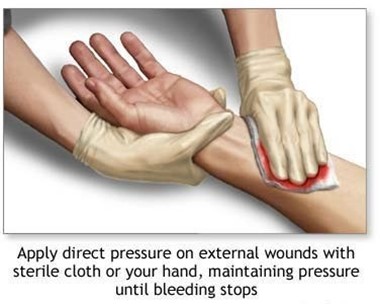A nurse is caring for a client who has a cardiopulmonary arrest. The nurse anticipates the emergency response team will administer which of the following medications if the client's restored rhythm is symptomatic bradycardia?
Magnesium
Sodium bicarbonate
Epinephrine
Atropine
The Correct Answer is D
Choice A Reason: This is incorrect because magnesium is not a medication for symptomatic bradycardia. Magnesium is a mineral that regulates muscle and nerve function, blood pressure, and blood sugar levels. Magnesium can be used to treat conditions such as torsades de pointes, eclampsia, or hypomagnesemia.
Choice B Reason: This is incorrect because sodium bicarbonate is not a medication for symptomatic bradycardia. Sodium bicarbonate is a substance that neutralizes acids and bases and regulates the pH of the blood. Sodium bicarbonate can be used to treat conditions such as metabolic acidosis, cardiac arrest, or overdose of certain drugs.
Choice C Reason: This is incorrect because epinephrine is not a medication for symptomatic bradycardia. Epinephrine is a hormone that activates the sympathetic nervous system and increases the heart rate, blood pressure, and blood flow to the muscles and brain. Epinephrine can be used to treat conditions such as anaphylaxis, cardiac arrest, or severe asthma.
Choice D Reason: This is correct because atropine is a medication for symptomatic bradycardia. Atropine blocks the action of the parasympathetic nervous system and increases the heart rate and conduction. Atropine is a medication that blocks the action of the parasympathetic nervous system and increases the heart rate and conduction.
Symptomatic bradycardia is a condition where the heart rate is slower than normal and causes symptoms such as dizziness, fatigue, chest pain, or fainting. Atropine can be used to treat symptomatic bradycardia by stimulating the sinoatrial node and the atrioventricular node, which are the natural pacemakers of the heart.

Nursing Test Bank
Naxlex Comprehensive Predictor Exams
Related Questions
Correct Answer is C
Explanation
Choice A Reason: This is incorrect because cleaning the wound is not a priority when the client is bleeding profusely. Cleaning the wound can also dislodge any clots that have formed and increase bleeding.
Choice B Reason: This is incorrect because applying a tourniquet is a last resort when direct pressure fails to stop bleeding. A tourniquet can cause tissue damage, nerve injury, and infection if applied incorrectly or for too long.
Choice C Reason: This is correct because applying direct pressure over the wound is the first and most effective action to stop bleeding from a wound. This is the first and most effective action to stop bleeding from a wound. Direct pressure compresses the blood vessels and prevents further blood loss. The nurse should use a clean cloth or dressing to cover the wound and apply firm pressure with both hands.
Choice D Reason: This is incorrect because elevating the limb and applying ice are not effective actions to stop bleeding from a wound. Elevating the limb can reduce blood flow to the injured area, but it does not compress the blood vessels or prevent blood loss. Applying ice can cause vasoconstriction, but it can also damage the skin and tissues if applied for too long.

Correct Answer is B
Explanation
The correct answer is: d. Brachial pulse in the right arm.
Choice A reason: Palpating the radial pulse in the right arm is not the most appropriate choice following a cardiac catheterization with a left antecubital insertion site. While it is contralateral to the insertion site, the brachial pulse is preferred over the radial pulse for assessing circulation in the arm, as it is more proximal and can provide a better indication of arterial flow from the catheterization site.
Choice B reason: The radial pulse in the left arm is the correct choice because it evaluates distal circulation in the affected limb. Since the catheterization was performed through the left antecubital fossa, it is crucial to monitor blood flow further down in the arm. Palpating the radial pulse helps detect early signs of compromised perfusion, such as diminished pulse strength. Evidence-based guidelines from clinical sources highlight the importance of distal pulse assessment post-catheterization.
Choice C reason: Palpating the brachial pulse in the left arm is also not recommended. Since the catheterization was performed on the left side, there is a risk of arterial occlusion or spasm, which could affect the accuracy of the pulse assessment in the left arm.
Choice D reason: The brachial pulse in the right arm does not provide relevant information about the left arm’s vascular status post-catheterization. Since the right arm was not affected by the procedure, its pulse does not indicate possible complications in the left arm. Clinical assessment should focus on detecting perfusion issues in the limb where the catheter was inserted. Best practices recommend prioritizing the evaluation of circulation in the affected extremity.
Whether you are a student looking to ace your exams or a practicing nurse seeking to enhance your expertise , our nursing education contents will empower you with the confidence and competence to make a difference in the lives of patients and become a respected leader in the healthcare field.
Visit Naxlex, invest in your future and unlock endless possibilities with our unparalleled nursing education contents today
Report Wrong Answer on the Current Question
Do you disagree with the answer? If yes, what is your expected answer? Explain.
Kindly be descriptive with the issue you are facing.
